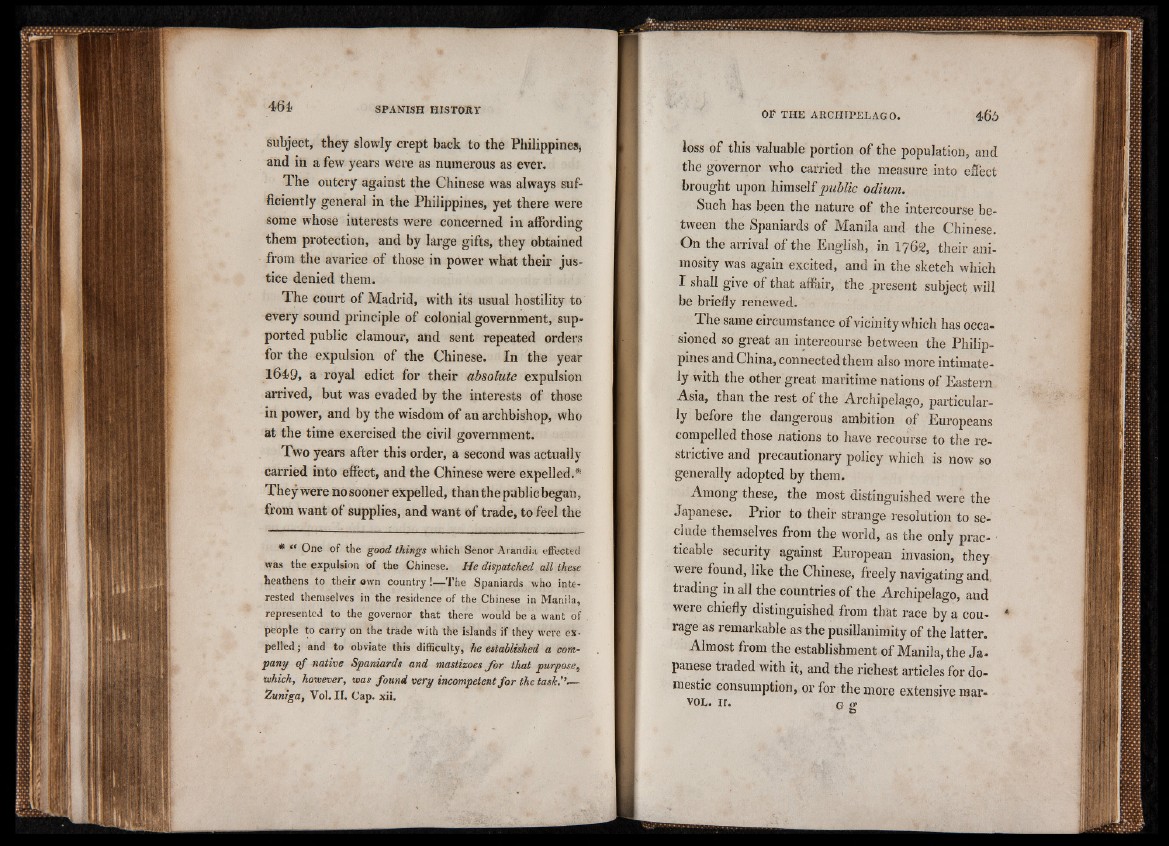
subject, they slowly crept back to the Philippine«}
and in a few years were as numerous as ever.
The outcry against the Chinese was always sufficiently
general in the Philippines, yet there were
some whose interests were concerned in affording
them protection, and by large gifts, they obtained
from the avarice of those in power what their justice
denied them.
The court of Madrid, with its usual hostility to
every sound principle of colonial government, supported
public clamour, and sent repeated orders
for the expulsion of the Chinese. In the year
1649, a royal edict for their absolute expulsion
arrived, but was evaded by the interests of those
in power, and by the wisdom of an archbishop, who
at the time exercised the civil government.
Two years after this order, a second was actually
carried into effect, and the Chinese were expelled.*
They were nosooner expelled, than the public began,
from want of supplies, and want of trade, to feel the
* “ One of the good things which Senor Arandia effected
was the expulsion of the Chinese. He dispatched all these
heathens to their own country !— The Spaniards who interested
themselves in the residence of the Chinese in Manila,
represented to the governor that there would be a want of
people to carry on the trade with the islands if they were expelled
; and to obviate this difficulty, he established a company
of native Spaniards and mastizoes fo r that purpose,
which, however, was found very incompetent for the task.’’.—
Zuniga, Vol. II, Cap. xii.
loss of this valuable portion of the population, and
the governor who carried the measure into effect
brought upon himself public odium.
Such has bpen the nature of the intercourse between
the Spaniards of Manila and the Chinese.
On the arrival of the English, in 1762, their animosity
was again excited, and in the sketch which
I shall give of that affair, the .present subject will
be briefly renewed.
The same circumstance of vicinity which has occasioned
so great an intercourse between the Philippines
and China, connected them also more intimately
with the other great maritime nations of Eastern
Asia, than the rest of the Archipelago, particularly
before the dangerous ambition of Europeans
compelled those nations to have recourse to the re-
stiictive and precautionary policy which is now so
generally adopted by them.
Among these, the most distinguished were the
Japanese. Prior to their strange resolution to seclude
themselves from the world, as the only practicable
security against European invasion, they
were found, like the Chinese, freely navigating and,
trading in all the countries of the Archipelago, and
were chiefly distinguished from that race by a cou- 4
rage as remarkable as the pusillanimity of the latter.
Almost from the establishment of Manila, the Ja-
panese traded with it, and the richest articles for domestic
consumption, or for the more extensive mar- VOL# If# q 0» to